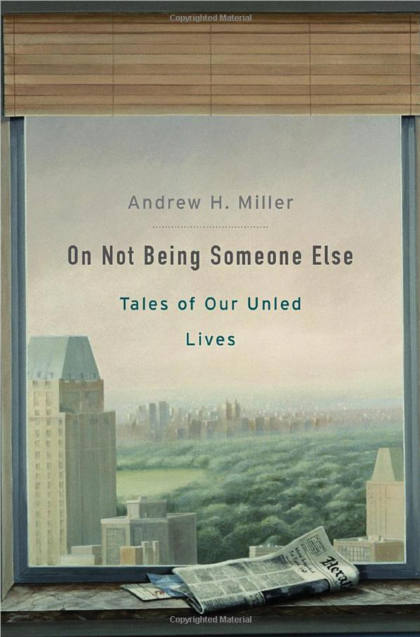We've all done it. Whether it was a bad day at the office, a tiff with a partner, or wondering how you've ended up living in the suburbs, we all second-guess the choices we've made and fantasized how our lives might have turned out if we'd made a few different choices here or there. Would I still be married to the same person if I hadn't moved across the country for a job?

Johns Hopkins English Professor Andrew Miller turns what could be a random afternoon's neurotic musings into a poignant meditation in On Not Being Someone Else (Harvard University Press). In it, he looks at fiction, poetry, and movies where characters ponder the lives they didn't lead. He turns to Philip Larkin, Charles Dickens, Lydia Davis, Elena Ferrante, Thomas Hardy, Henry James, Ian McEwan, Maggie Nelson, Virginia Woolf, It's a Wonderful Life, and many, many more, all while throwing in an occasional entertaining quote from Neil Diamond or a friend, who describes this book as "YOLO + FOMO." The result is like having a really entertaining after-dinner conversation with somebody who has wonderfully thought way too much about a subject and is eager to share his ideas and an endless supply of coffee.
Miller cites Robert Frost's "The Road Not Taken" as the foundational "unled lives" text for his study, and he's miraculously able to reexamine that staple of middle-school English class in a way that spotlights what he calls its metaphysical resignation: "To be sorry you can't be one traveler on two roads—to be sorry you can't be two places at once—is to be sorry for what you are, for what we are."
Such existential anomie, Miller admits, is an exercise prone the middle aged, but he shirks any effort to drift into self-help territory and instead focuses on the comforting joys of the intellectual and aesthetic pleasure that comes from reading about unled lives imagined by creative writers. And he's able to discuss how language captures the moods, feelings, and emotions that can be difficult to articulate: In one section he discusses Sharon Olds' poem "To Our Miscarried One, Age Thirty Now" and zeroes in on the use of "one" in the title: "not nothing, but not much either. It's the proper name of almost nothing. . . . But one is unattached to the world, a cloud, amorphous vapor, not even a voice in the wind. And so even in the word 'one' there's loss." Miller sustains this level of engaging thoughtfulness throughout.
Posted in Arts+Culture
Tagged literature, english, nonfiction







